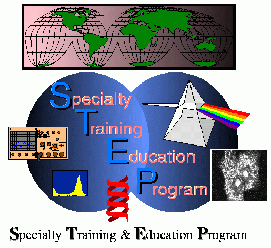


[Introduction to STEP]
[Specialty Areas]
[STEP Committee Members]
[Search for Keyword]
Assays of Drug Resistance
Cytometry Laboratory Department of Medicine Ontario Cancer Institute/ Princess Margaret Hospital 610 University Avenue Toronto, Ontario M5G 2M9 CANADALaboratory Profile
Head: Dr. David Hedley, M.D.
1. Facilities: Approximately 800 square foot laboratory containing instrumentation, sample preparation space, biohazard hood, computers, and fluorescence microscope. The OCI/PMH is the largest cancer research and treatment facility in Canada, with a large number of clinical samples available from the hematology malignancies. The OCI/PMH is adjacent to the main University of Toronto campus and the major downtown teaching hospitals.
2. Instrumentation:
(1) Epics Elite equipped with argon, HeCd, and HeNe lasers, plus 5 PMT's. Temperature control for measuring reaction rates in live cells.
(2) SAMBA 4000 image analysis system fitted for fluorescence and transmission microscopy.
(3) Tissue culture facilities, and fluorescence and absorption spectrometers are available within the research area.
(4) All data analysis is IBM PC-based. The flow cytometer is networked (Artisoft Lantastic) to a second computer for off-line data analysis. Software includes Coulter Elite, MultiCycle, MultiTime (Phoenix), plus Word Perfect, Microsoft Excel, and Reference Manager.
3. Specialization Areas: Major interest is in development and application of cytometric methods for studying cancer chemotherapy resistance mechanisms. Dual labelling for surface immunophenotype plus P-glycoprotein expression, using both functional assays and surface antibody labelling. Extensive experience with measurement of cellular glutathione using both flow and image cytometry. Emphasis on application to clinical samples, calibration, and quality controls.
4. Special Opportunities: In addition to drug resistance assays, we have extensive experience in other cell function assays with flow cytometry, particularly intracellular pH measurement.
(N.B. Laboratory Head refuses to do DNA analysis out of paraffin blocks!)
5. Special Courses Offered: None offered at this time.
6. Graduate Program: The institution is a University of Toronto teaching hospital, and the Laboratory is linked to the Department of Medical Biophysics, School of Graduate Studies, University of Toronto.
7. Local Accommodations: The hospital is within easy walk of downtown hotels. Inexpensive accommodation can be arranged at the University of Toronto.
8. Transportation: Ground transportation from Toronto Airport (YYZ) is via airport bus ($12) to downtown (every 20 minutes); or take airport bus to Islington subway station. Nearest subway station is Queen's Park (100 yards).
9. Cost of Internship: None unless expensive antibodies used.
10. Communication:
Dr. D. W. Hedley Department of Medicine Princess Margaret Hospital 610 University Avenue Toronto, Ontario M5G 2M9 CANADA Phone: (416) 946-2262 FAX: (416) 946-6546 E-mail: mohedley@spiff.pmh.toronto.on.ca
